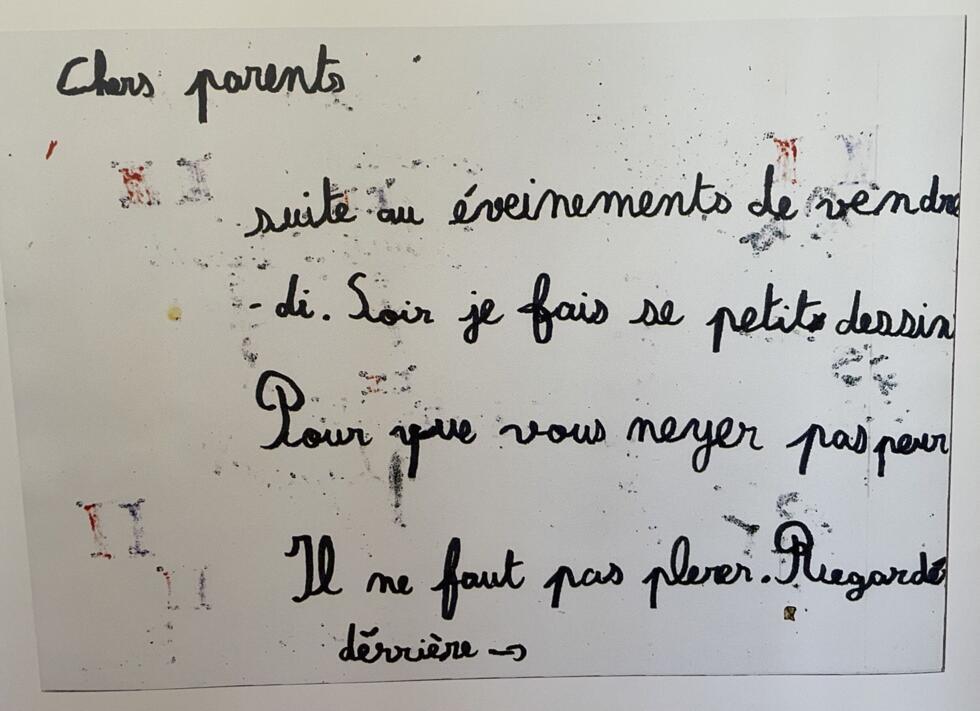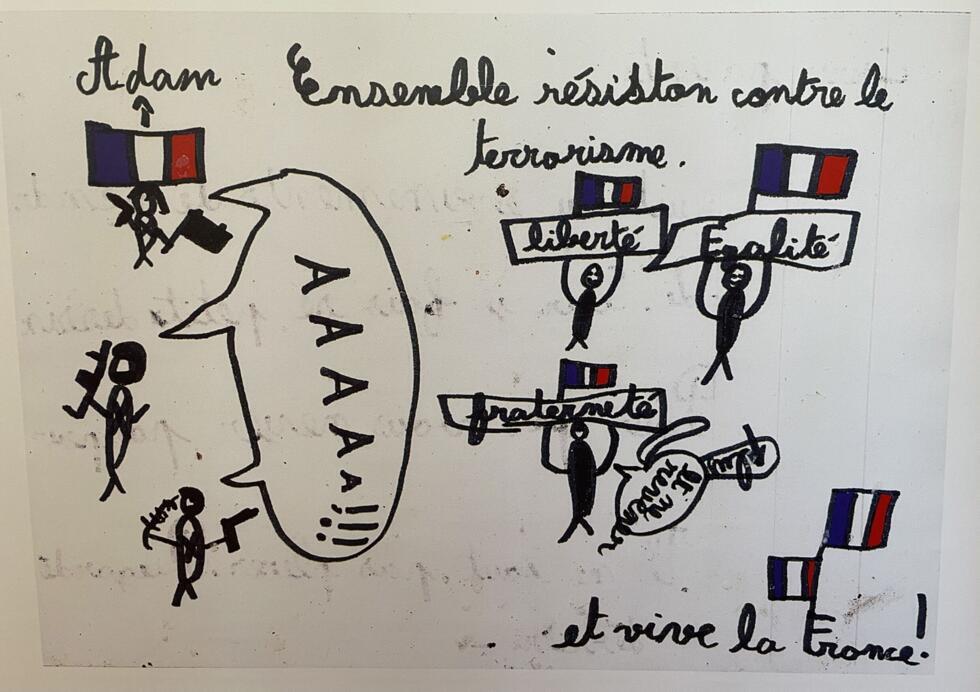

As France marks 10 years since the November 13 attacks, a new study is examining how trauma is still rippling through affected families and reshaping the lives of the next generation who were children when the violent attacks tore through Paris.
It has been 10 years since terrorists carried out a series of coordinated attacks across Paris that killed 130 people and left a nation in shock. But the reverberations of that night continue to shape countless lives, from those who survived the violence, to those who lost loved ones, to the first responders who rushed to help. And among them are the children who have grown up in the shadow of November 13.
While some children lost parents, others witnessed their own parents’ trauma unfold in the years that followed. For these families, the past 10 years have been a quiet, ongoing effort to adapt to a moment that changed their lives forever. And the place they find themselves in today, whether or not they have been able to reconstruct themselves after that fatal night, is at the heart of a groundbreaking study on trauma led by French researchers.
Years of reconstruction
It was going to be a jam-packed weekend for Caroline Jolivet and her husband Christophe. They had tickets to go see the Eagles of Death Metal rock band at the Bataclan concert hall in Paris on Friday, November 13, 2015, but also had other shows lined up for Saturday and Sunday.
“Christophe’s philosophy was that we would rest when we're old,” Jolivet recalls.
Opting for a more quiet night, she decided to stay home with their children, aged 2 and 6 at the time. So her husband headed out and Jolivet put the children to bed.
Less than two hours had passed when news of the terrorist attacks began to spill out on the TV and radio. “The kids were asleep when I found out,” Jolivet says. “I spent the whole night on the phone calling hospitals, but I had no news [about Christophe].”
When the children woke up, they asked where their father was. “I just told them that he was in hospital and that we couldn't go see him,” Jolivet explains. “I knew what had happened was very bad, but I didn't know [that he had died].”
Christophe was killed immediately after being shot in the concert pit at the Bataclan. But the family only received the news of his death the following Monday evening. “I completely lost my bearings, everything collapsed,” Jolivet says.
In the blur of the tragedy that had just torn through her family, Jolivet became acutely aware that, as the remaining responsible adult, she would have to take the lead. “I had to be functional. I had to manage on my own. But the truth is, in those moments, you're not functional,” the mother of two explains.
Shortly after the attacks, a crisis unit was set up at the city hall of the 11th arrondissement (district) of Paris. Jolivet quickly went to seek help and was referred to a therapist specialising in trauma who would go on to provide her with tools on how to cope with post-traumatic stress disorder (PTSD).
And almost just as quickly, she sought help from child psychologists to support her children too. “I remember a moment where I thought it was just too difficult, that I wouldn't manage. For a second, I wanted to be with Christophe. But I quickly brushed that thought aside. It was out of the question that I would abandon my children," she explains.
"I decided to do everything in my power to give them some resemblance of the life we had planned for them.”
Losing their father so suddenly and under such violent circumstances had profound effects on Jolivet's children. For three years, they did not want to go to sleep. “Nighttime became the moment you could lose a parent,” she says.
She also describes being struck by how her children had similar feelings of guilt or regret that she struggled with herself in the years following the attacks.
“They would use their own words, but they would express the same yearning to have been there [with Christophe], the same guilt about letting their father leave the flat – things that I had never uttered in front of them,” Jolivet recalls.
Her desperation to find solutions for her children even led Jolivet to change career paths. “It became an obsession, and eventually, I found tools that worked,” she says.
Jolivet went from working as a digital project manager at French magazine Nouvel Obs to working as a hypnotherapist and as a sophrology deep-relaxation practitioner. She has since published several children's books on trauma. “I wanted to help others too,” she says.
‘Radioactive’ trauma
The psychological consequences of the 2015 Paris attacks were profound. A public health survey from 2019 found that 54 percent of those who lost a loved one in the attacks suffered from PTSD and 49 percent had severe depression.
“Back in 2015, psychologists and psychiatrists didn't know much about trauma,” explains Thierry Baubet, head of the child psychopathology department at Avicenne Hospital in the northern suburb of Bobigny. “When I studied psychiatry, trauma only took up half a page in my 500-page manual.”
France has undergone a reckoning in how it treats trauma since the attacks.
Regional trauma centres have opened up across the country to help people dealing with PTSD as part of an initiative from the National Resource and Resilience Centre, a public health institution mandated by former president François Hollande in the aftermath of the attacks to inform the general public on trauma.
“But the children of those affected by the attacks is a topic that has been overlooked,” Baubet says. “Parents are worried about the harm they could cause their kids as a result of their own trauma, which they carry inside of them as if it were radioactive.”
“It is even more complicated in families where one parent died and the surviving parent – who is mourning – had to take care of their child or children,” Baubet goes on to explain.
“We've seen cases of kids who try to hide their suffering to protect their parents from feeling even worse. The children seem to have everything under control, but when their traumatised parent gets better years later, they break down and can become depressed,” he says.
And research has shown that the impacts of a traumatic event can be felt decades, even generations, after it occurred.
'Secondary trauma'
Along with experts from other disciplines, Bérengère Guillery, a child neuropsychologist and research director at the École pratique des hautes études in Paris, is carrying out a study on how families adapted after being exposed to the large-scale traumatic event that was November 13, 2015.
The study will examine 240 people who were under 18 at the time of the attacks and is aimed at understanding the inner mechanisms of trauma, how it can be transmitted and how resilience is built.
"By resilience, I mean the ability to adapt and rebuild oneself after a traumatic event, including in relation to family, friends and even society at large. It is not about going back to the way we were, but about a sense of stability," Guillery explains.
Half of the 240 participants were directly exposed to the attacks – either losing one or both parents, or having parents who witnessed the events firsthand. The other half serve as a control group with no direct exposure.
Each participant will go through a series of interviews to assess their subjective experience of the attacks, but objective measures like cortisol levels and cognitive exercises will also be measured.
“The attacks fundamentally changed how families operated. Traumatised parents changed their parenting styles with new behaviours and this had a knock-on effect on their children," says Guillery. "But children also went through profound changes of their own, both on a psychological and physiological level."
“Some kids had problems sleeping, or were afraid to take the metro. Some parents became hypervigilant, constantly worrying about their kids. Some families spoke openly about the attacks, others avoided the topic entirely,” Guillery explains.


“The trauma the children endured varies based on their exposure,” Guillery says. “Some children whose parents survived the attacks suffer from secondary trauma, the symptoms of which are quite similar to PTSD – intrusive memories, difficulty concentrating, hypervigilance, for example. Some also suffer from anxiety or depression.”
Whereas children who lost one or both parents in the attacks are more likely to have PTSD themselves or suffer from prolonged grief disorder. “The loss of a parent is traumatic, [and] 10 to 32 percent of children will still feel a profound sense of grief long after their parents are gone ... that can lead to distress, avoidance and difficulties reintegrating back into daily life,” Guillery says.
“But that is not the case for all of the people who were exposed to the attacks as children,” Guillery explains.
Observations from the past 10 years have shown how some families have built resilience around their trauma as well. “The event brought some families closer,” the researcher points out.
“Each participant will come with their unique experience and trajectory. Our job is to study how families adapted so that we can better support them in the future,” Guillery says.
The second phase of the study will include children of parents who were exposed to the November 13 attacks but who were not yet born at the time, to look at how trauma can be passed down genetically from one generation to the next.
A new identity
The memory of the November 13 attacks lives on, and Guillery believes that the ripple effects will still be felt by those who were exposed for years to come. “It was a traumatic event that happened once, ten years ago, but [the memory] is regularly revived with commemoration ceremonies, articles in the press, the trial in 2022 ...” she explains.
“Even on a personal level, over the course of a lifetime, the event will be revived and need to be reintegrated," says Guillery. "When those who were children at the time have kids of their own, for example.”
For Jolivet and her children, regaining a semblance of normal life has taken years and is still an ongoing process. “My children are teenagers now, and they have needed psychological support at every stage of their development. It takes new words and new explanations for them to regain a sense of balance. It's very demanding,” she says.
“We do not simply turn the page on a traumatic event. It is something that we integrate as part of our identity,” Guillery says.
“The aim is for that integration to be constructive rather than destructive.”